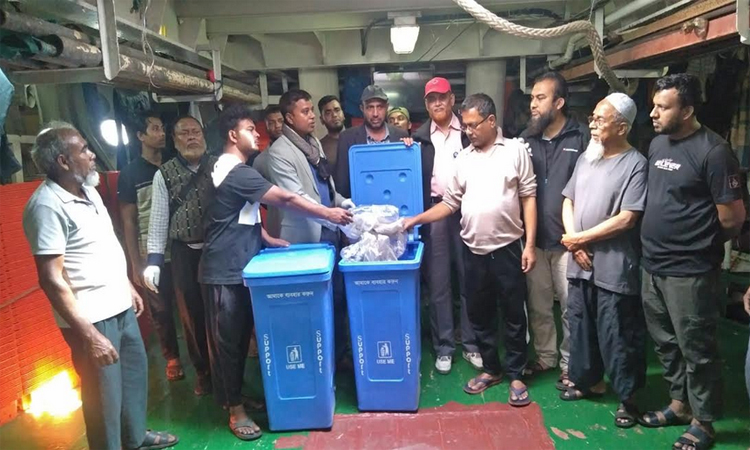News Flash

KHULNA, May 11, 2025 (BSS) - In a landmark move to combat marine pollution, Bangladesh's Department of Marine Fisheries (DoMF) has launched an initiative to free the Bay of Bengal from men creating plastic pollution that has been posing a serious threat to fishery resources, human health and the blue economy.
Initially, the DoMF has launched an initiative to prevent commercial fishing trawlers from dumping plastic and other non-biodegradable waste into the Bay of Bengal.
Since January 2024, the department has been working with 250 commercial trawlers to install onboard waste bins, enabling crews to bring their garbage back to shore rather than discarding it at sea.
The effort is expected to keep 20 to 25 metric tons of plastic and polythene waste out of the ocean annually.
Md Faruk Hossain Sagar, assistant director (Ocean) of the DoMF in Chattogram, said the initiative followed an awareness campaign started in December 2024 targeting trawler owners, masters, crew members, and fishing associations.
"Fishermen typically carry food and supplies wrapped in plastic and polythene, which were often thrown into the sea after use," he said. "Now, with the installation of bins, this waste is being collected and brought back for proper disposal."
The collected waste is handed over to the Chattogram City Corporation (CCC) for dumping at designated sites.
He noted that each trawler carries 30 to 50 sailors on trips lasting 15 to 30 days. Without intervention, the amount of waste discarded at sea would significantly pollute the marine environment, destroy fish habitats, and disrupt the food chain.
"Plastic waste not only harms marine ecosystems but also ends up in fish consumed by humans, posing severe health risks," he said.
In support of the initiative, the Marine Fisheries Department issued an official circular in December 2024, urging trawler owners to install waste bins. The Bangladesh Marine Fisheries Association has also joined efforts to implement waste management practices across the fleet.
Director of the Marine Fisheries Department in Chattogram, Md Abdus Sattar, emphasized the urgency of the situation.
"Plastic and torn nets dumped into the sea disrupt biodiversity and contribute to ghost fishing," he said. "We must stop this cycle. Bringing back waste to shore must become a social movement."
According to a recent survey, approximately 30,000 mechanized vessels operate in the Bay of Bengal. The DoMF plans to gradually expand the initiative to include all of them, ensuring sustainable fishing and long-term preservation of marine resources.
Dr Zahidul Islam of the Khulna Diabetic Association warned that while seafood is generally healthy, the increasing presence of microplastics in marine life is a growing concern.
"We are consuming fish that ingest microplastics, which can lead to serious health complications," he said. "Protecting the ocean means protecting ourselves."